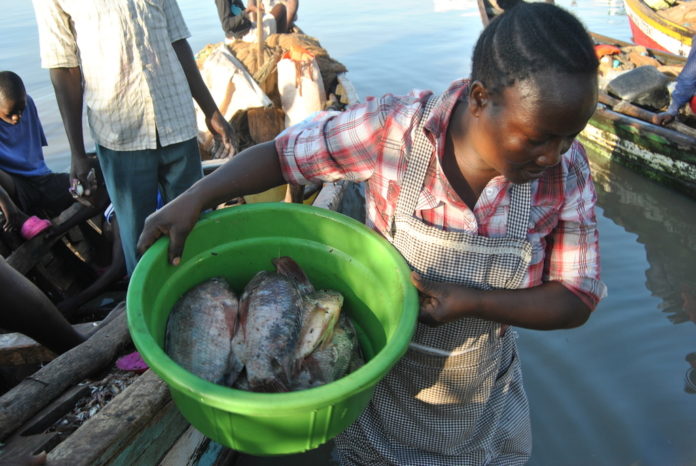Kisumu, April 8 — At 7 am in the morning, fishermen are docking in their fishing boats on the Dunga Beach in Kisumu’s Lake Victoria shores in western Kenya. They bring ashore their night’s catch and fishmongers crowd around their boats, buying the catch from them.
Among the most popular fishes that the Lake is known for is the tilapia and the Nile Perch; the mongers scamper for them as they are well aware that they will not miss a buyer this time around.
A few weeks ago, this was not the case as there was a steady import of, especially the tilapia species, from China into the Kenyan market. The import had negatively affected the trade in locally-sourced fish in the country as many people do not know the difference and had hence quit eating the fish altogether.

At the shores, Francisca Odhiambo, a 44-year-old mother of five is busy buying fish from the fishermen, then scaling and gutting them for sale to the traders who come to the shores to buy and transport the fish to different parts of the country.
From the first fisherman, Odhiambo buys a dozen fish, which she scales and guts, and after a few minutes, she sells them all off and awaits the next boat to dock.
“Now, the trade is better than before as people are now sure that there is no fish coming in from China after they heard that China is the place where the coronavirus broke out from. And even though the coronavirus scare has slowed down the consumption of the fish in hotels and restaurants in towns, many of the fish is going to homes as many people stay home and order that the fish be taken to them,” she says.

There had been concerns surrounding the import of fish from China, as it was hurting the trade of the fish in Kenya. During a meeting with small scale traders at Strathmore University in Nairobi in October 2018, Kenyan president Uhuru Kenyatta had promised to stop the fish imports, saying that the country could say “the Chinese fish was bad”. This prompted Beijing to take action, also promising to stop funding key projects in the country, including the standard gauge railway (SGR).
Nairobi then quickly backed down, allowing more of the Chinese fish to be imported and sold around the country.
The virus outbreak, that is stretching the world’s health apparatus has in a way proved to be a blessing in disguise for the Kenyan fish traders as their businesses now boom.

Fredrick Omondi, a resident of Kisumu says that now there is a sigh of relief as he is now able to eat fish without worrying about its quality and source.
“Born here on the shores of the Lake, we have always known no other staple food apart from fish. Fish is what defines us as the Luo tribe and for the past few years, we have had to worry about the fish we get, especially the ngege (tilapia). I wonder why our government would allow the Chinese to saturate our fish market when we have our own fish,” Omondi poses.
Aloice Ager, the director of Kisumu Governor’s press unit and the county government spokesperson expresses optimism that the local supply of fish in the county can feed the whole country without having to import fish.
“What had prompted the import of fish from China was the hyacinth that had clouded the Lake and suppressed the breeding of fish. But now, after the clean-up the riparian counties around the Lake are reporting catching of large numbers of fish,” Ager says.

The clean-up of the lake has created more opportunities for our people as more fishermen now want to go back to the Lake to fish since there is now plenty of fish. Lake Victoria is not only able to feed the East African market but the world market as we have enough fish. There is no need for fish from outside,” he continues to point out.
Back at the Beach, one can observe that there is minimal movement as compared to other times and even as many would attribute this to the advice by the Ministry of Health and the World Health Organization (WHO), Mary Achieng’, one of the fishmongers says that this has also been contributed by the trust that people now have.

“Initially, people would come to the lake to actually buy from us here and make sure that the fish we give them is the real fish that is gotten from the Lake. Now, they know there is no Chinese fish, so they will just comfortably buy from the market or have it delivered to their homes,” she says.

As for Odhiambo and her colleagues at Dunga Beach, their prayer is that things will remain this way so that they can be able to fend for their families even after the coronavirus is gone and things come back to normal.
“I just appeal to the government to stop the importation of Chinese fish. We have no other jobs and fully depend on this one. If the government is mindful enough of our future, it will stop the Chinese fish imports because we have enough fish to feed the country,” Odhiambo concludes.

